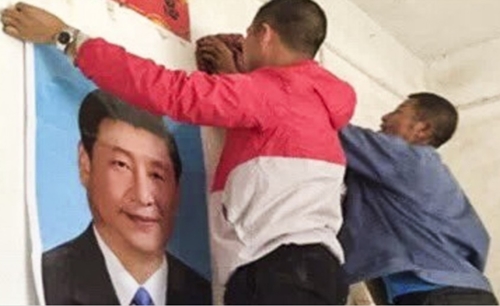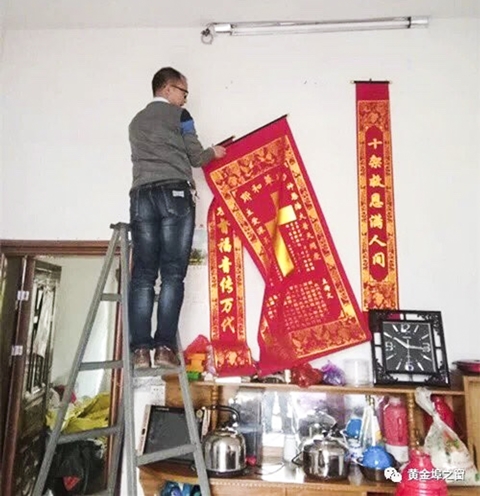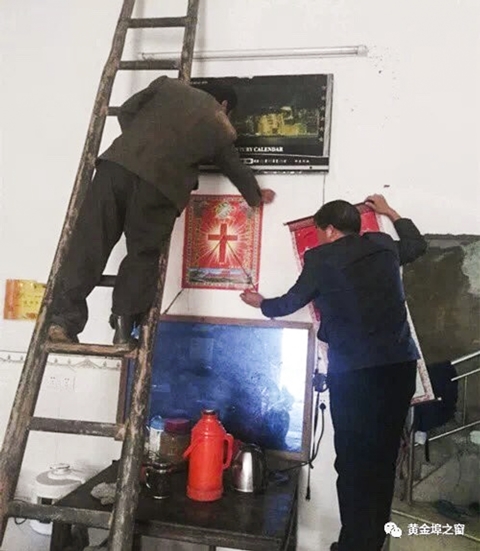
Men put up a poster of Chinese President Xi Jinping in a home in Yugan county, southern China’s Jiangxi province.
The local government has launched a campaign to “transform believers in religion into believers in the party”. (Photo: Lvv2.com)
Thousands of Christian villagers in China have been told to take
down displays of Jesus, crosses, and gospel passages from their homes as
part of a government propaganda effort to “transform believers in religion into believers in the party.”
According to The South China Morning Post
(SCMP), Communist Party of China (CPC) officials visited Chritian
believers’ homes in Yugan county of Jiangxi province where about 10
percent of the population are Christians. They urged residents to
replace personal religious displays with posters of President Xi
Jinping; more than 600 removed Christian symbols from their living
rooms, and 453 hung portraits of the Communist leader, according to
SCMP.
The efforts were part of a government campaign to alleviate poverty
in the region, since some CPC members believe families’ faith is to
blame for their financial woes, according to SCMP. The poster swaps in
villagers’ homes represent the party’s desire to have residents look to
their leaders, rather than their Savior, for assistance.
“Many poor households have plunged into poverty because of
illness in the family. Some resorted to believing in Jesus to cure their
illnesses,” the head of the government campaign told SCMP.
“But we tried to tell them that getting ill is a physical
thing, and that the people who can really help them are the Communist
Party and General Secretary Xi.”
Though the party denies the claim, some Christians in Yugan county
say they were told they would not be eligible for government assistance
unless their posters were removed.

A local social media account reported over the weekend that in
Yugan’s Huangjinbu township, cadres visited poor Christian families to
promote the party’s poverty-relief policies and helped them solve their
material problems.
The officials successfully “melted the hard ice in their hearts” and “transformed them from believing in religion to believing in the party”, the report said.
As a result, more than 600 villagers “voluntarily” got rid of the religious texts and paintings they had in their homes, and replaced them with 453 portraits of Xi.
The report had disappeared on Monday afternoon, but the campaign
was confirmed by villagers and local officials contacted by the South
China Morning Post.
Qi Yan, chairman of the Huangjinbu people’s congress and the person
in charge of the township’s poverty-relief drive, said the campaign had
been running across the county since March. He said it focused on
teaching Christian families how much the party had done to help
eradicate poverty and how much concern Xi had shown for their
well-being.
“Many poor households have plunged into poverty because of
illness in the family. Some resorted to believing in Jesus to cure their
illnesses,” Qi said.
“But we tried to tell them that getting ill is a physical thing
and that the people who can really help them are the Communist Party
and General Secretary Xi.”
Huangjinbu is home to about 5,000 to 6,000 Christian families, or about a third of the total, according to Qi.

“Many rural people are ignorant. They think God is their
saviour … After our cadres’ work, they’ll realise their mistakes and
think: we should no longer rely on Jesus, but on the party for help,” Qi said.
He said the township government had distributed more than 1,000
portraits of Xi, and that all of them had been hung in residents’ homes.
A resident of another township in Yugan, surnamed Liu, said that in
recent months many of his fellow villagers had been told to remove
religious artefacts from their homes.
“Some families put up gospel couplets on their front doors
during the Lunar New Year, some also hang paintings of the cross. But
they’ve all been torn down,” he said.
"Many believers did not do so voluntarily," Liu said. “They
all have their belief and, of course, they didn’t want to take them
down. But there is no way out. If they don’t agree to do so, they won’t
be given their quota from the poverty-relief fund,” he said.
But Qi dismissed claims that the funds were contingent on the religious posters being removed.
“We only asked them to take down [religious] posters in the
centre of the home. They can still hang them in other rooms, we won’t
interfere with that. What we require is for them not to forget about the
party’s kindness at the centre of their living rooms.”
It was not an either-or situation, Qi said. “They still have the freedom to believe in religion, but in their minds they should [also] trust our party.”
Under Xi, the party has tightened its grip on religious freedom
throughout the country, ranging from removing crosses on Christian
churches in eastern China to suppressing Islamic practices in the Uygur
heartland of Xinjiang in the name of fighting terrorism and separatism.
No comments:
Post a Comment